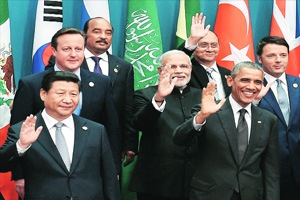Prime Minister Narendra Modi on Saturday said reforms should be large-scale, deep-rooted and not undertaken by stealth. He was making a special intervention on Day 1 of the Group of 20 plenary session in Brisbane following an invitation by Australian Prime Minister Tony Abbott, who is hosting the leaders’ summit.
Outlining his vision of reforms before a global audience for the first time, Modi drew from his experience in Gujarat and talked about the thrust on reforms India will place going forward. “There is bound to be resistance to change or reform. But it cannot be done in stealth,” he said.
Significantly, he said globally reforms were handicapped by the perception of being government programmes and a burden on the people. “This needs to change,” he observed, adding that there is a need for reforms to be people-centric and driven by the people.
More importantly, he said there is a need to “insulate reform from the political process”. This is interesting given that certain ideas like FDI in multi-brand retail have met with opposition within his own party.
Projecting a confident face, he told European Council president Herman Van Rumpoy that there was a “wind of change in India” and no lack of political will now. “Come, see for yourself,” he told Van Rumpoy, when the latter pointed out to him that it was poor political will that had stalled the India-European Union Broadbased Trade and Investment Agreement initiated seven years ago in 2007.
Seeks BRICS support in black money mission
Prime Minister Narendra Modi on Saturday pushed his government’s domestic agenda on black money at an informal meeting of BRICS leaders ahead of the Group of 20 Leaders Summit.
The BRICS meet is intended to coordinate positions among the five big developing economies of the world, so that they can pull in their combined weight at the G20 Summit. Modi called for close coordination on unaccounted money stashed abroad, and said its repatriation to India was a key priority for his government. “Unaccounted money abroad is also linked to security challenges,” he told the leaders of Brazil, Russia, China and South Africa. The leaders took stock of the progress made in establishment of the New Development Bank (NDB) and the Contingent Reserve Arrangement (CRA), agreed upon in the sixth BRICS Summit.
The leaders asked their finance ministers to designate the president and vice-presidents of the new bank well in advance of the next BRICS summit.
Modi said the NDB and the CRA signal the group’s collective capacity to create and manage global institutions. India hoped to ratify the agreement by the end of the year, he said. “We will soon nominate our candidate for the post of the presidency,” the PM said in his opening remarks.
The seventh BRICS Summit is scheduled to be held in the Russian city of Ufa next year. “The leaders also announced the setting up of an interim board of directors that will lead the next phase establishing the NDB,” a media note said.
The leaders also asked the governors of their respective central banks to ensure that the Inter-Central Bank Agreement foreseen in the CRA be concluded by the time of the summit in Russia.
Modi said the NDB could be effective in promoting sustainable development and bridging infrastructure gaps. “We can be more aligned to local conditions and requirements. We should focus on next-generation infrastructure,” he said. According to Modi, BRICS could promote new models of governance and financing, while maintaining the highest standards of banking.
The leaders—president Dilma Rousseff of Brazil, president Vladimir Putin of Russia, president Xi Jinping of China, president Jacob Zuma of South Africa and prime minister Narendra Modi—exchanged views and shared perspectives on measures to promote growth and create jobs. The G20 has set a target for growing their economies by an additional 2% over the next five years. They also discussed issues related to infrastructure, trade, energy, strengthening of the financial system, and cooperation in tax matters.

